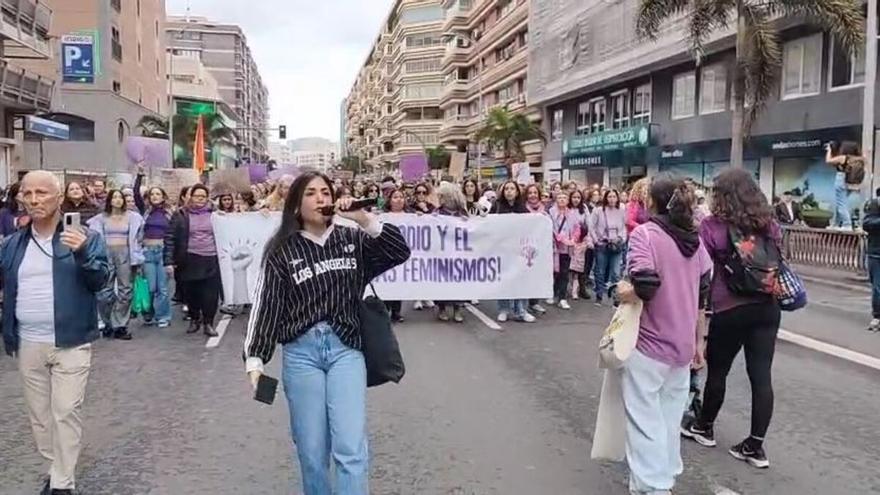
This Saturday, March 8th, the International Women’s Day celebrations have been overshadowed by the assault on a woman in Lanzarote. According to the report from the Government delegate in the Canary Islands, Anselmo Pestana, the 55-year-old female victim remains in a critical condition following alleged stabbings from her partner.
As the situation of the woman in Lanzarote is monitored, thousands of women and men took to the streets in the two Canary capitals on Saturday to commemorate March 8, undeterred by the rain, wind, or the carnival festivities, with feminist demands taking centre stage.
In Las Palmas de Gran Canaria, the demonstration commenced at San Telmo Park, accompanied by a musical performance from feminist polkas, and saw substantial participation from institutional and political figures, including the Government delegate in the Canary Islands, Anselmo Pestana, the city’s mayor, Carolina Darias, vice president of the Cabildo, Augusto Hidalgo, and Insular Councillor Isabel Mena.
Also present were the NC president, Román Rodríguez, along with his party colleagues Pedro Quevedo, Carmelo Ramírez, and Luis Campos, as well as national deputies from PSOE and Podemos, notably Fernando López Aguilar.
López Aguilar, who advocated for the Gender Violence Law during his tenure as Justice Minister in 2004, urged men to engage in the feminist struggle and emphasised that education surrounding equality should be strengthened from a young age.
In the digital sphere, it is crucial to address how adolescents consume information about violence on social networks, whose algorithms tend to proliferate such content.
López Aguilar affirmed that the feminist movement must persist, highlighting that its worth is evident, despite ongoing tragedies of women being killed merely for their gender, although statistics have shown a significant decline in victim numbers in Spain over the past two decades.
Against False Narratives
The head of CCOO in Gran Canaria, Esther Ortega, expressed concern that, despite legislative advancements for women’s rights, there has been a regression in practice. She asserted that the key message for today should be to reject “the false narratives and disinformation that the far-right propagates, as the harsh reality remains that women murdered are not mere fabrications; they are true tragedies,” she contended.
CCOO has insisted that governments must invest in human resources, strive for equitable policies, and ensure that the gender perspective is incorporated within the judiciary.
In response to Minister Felix Bolaños’ announcement of a 50% increase in judges to handle cases of violence against women, Ortega stated there should be no delay until 8M to strengthen the judiciary.
Mayor Carolina Darias underscored the importance of fighting for further achievements in real and effective equality, insisting that these goals must be pursued “together and collectively.”
In addition to unions like UGT and Cobas, NGOs such as CEAR, scouting groups, and PCPC members, the march in Las Palmas de Gran Canaria featured the Association of Women’s Women and Audiovisual Media, which called for “an equal and diverse industry.”
8M in Santa Cruz de Tenerife
In Santa Cruz de Tenerife, the demonstration began at Plaza de la Paz and concluded at García Sanabria Park, where women from various backgrounds and ages read the manifestos outlining their demands.
Despite intermittent rain and strong winds, the participants remained undaunted: “The rain won’t halt the feminist wave,” chanted the protesters.
The overlap with the Carnival Day festivities in both Canary capitals led to many individuals attending in costume, including elderly women from rural areas in Tenerife, paying homage to this demographic.
Some of the slogans voiced included, “If we touch all,” “alone, drunk, I want to get home,” “this is not an isolated incident, it’s called patriarchy,” “machismo is terrorism,” and “there is nothing more macho than an imperialist war.”
The impact of war was particularly highlighted in the manifesto, noting how women are the primary victims of such violence, citing instances in Palestine and Western Sahara.
The geopolitical climate threatens hard-won rights, and thus, feminism must extend its reach to protect these rights, as emphasised in the manifesto read in Santa Cruz de Tenerife.
A special acknowledgment was given to African feminisms, with a call for a feminism that combats racism, labour and sexual exploitation, while advocating for the neutrality of the Canary Islands.
















